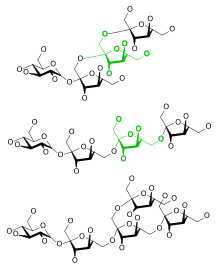| This article needs more reliable medical references for verification or relies too heavily on primary sources. Please review the contents of the article and add the appropriate references if you can. Unsourced or poorly sourced material may be challenged and removed. Find sources: "Psychobiotic" – news · newspapers · books · scholar · JSTOR (December 2018) |  |
Psychobiotics is a term used in preliminary research to refer to live bacteria that, when ingested in appropriate amounts, might confer a mental health benefit by affecting microbiota of the host organism. Whether bacteria might play a role in the gut-brain axis is under research. A 2020 literature review suggests that the consumption of psychobiotics could be considered as a viable option to restore mental health although lacking randomized controlled trials on clear mental health outcomes in humans.
Types

In experimental probiotic psychobiotics, the bacteria most commonly used are gram-positive bacteria, such as Bifidobacterium and Lactobacillus families, as these do not contain lipopolysaccharide chains, reducing the likelihood of an immunological response. Prebiotics are substances, such as fructans and oligosaccharides, that induce the growth or activity of beneficial microorganisms, such as bacteria on being fermented in the gut. Multiple bacterial species contained in a single probiotic broth is known as a polybiotic.
Gut-brain axis
Psychobiotics are probiotics that influence the gut-brain axis, the bidirectional communication network linking the gastrointestinal system and the brain. By positively modulating the gut microbiota, psychobiotics can impact the production of neurotransmitters, reduce inflammation, and enhance neural signaling, which may improve mental health and alleviate symptoms of neurological disorders. This highlights their potential as a therapeutic tool for maintaining a healthy gut-brain connection.
Research
A 2021 review showed that treating anxiety in young people with psychobiotics had no significant effect. This study highlights the gut microbiome's role in brain function and mental health is a growing research area, particularly during adolescence, a critical period for gut-brain axis development. This study systematically reviewed and analyzed the effects of psychobiotic interventions on anxiety in youth (ages 10–24). Among 5416 studies identified, 14 were reviewed, and 10 included in the meta-analysis, involving 617 participants. The results showed minimal efficacy of psychobiotics in reducing anxiety, with a pooled standard mean difference of −0.03, indicating no significant effect. Despite limited evidence, future research focusing on mechanisms, causality, and youth perspectives is essential for advancing psychobiotic use in mental health management.
Another 2022 article highlights how the nervous system disorders affect millions globally each year, sparking interest in the potential of probiotics to support the gut-brain axis alongside traditional treatments. Psychobiotics, a type of probiotic, have shown promise in improving gut microbiota and alleviating symptoms of central nervous system (CNS) disorders. This study reviewed their impact on conditions like autism spectrum disorders, Parkinson's disease, multiple sclerosis, depression, and insomnia, among others. The findings suggest that psychobiotic-containing functional foods could be an effective tool for improving mental health and managing CNS disorders.
There is a need for more diverse human studies, mainly because those that exist have contradictory outcomes.
Species

Several species of bacteria have been used in probiotic psychobiotic research:
- Lactobacillus helveticus
- Bifidobacterium longum
- Lactobacillus casei
- Lactobacillus plantarum
- Lactobacillus acidophilus
- Lactobacillus delbrueckii subsp. bulgaricus
- Bifidobacterium breve
- Bifidobacterium infantis
- Streptococcus salivarius
- Lactobacillus rhamnosus
- Lactobacillus gasseri
References
- ^ Sarkar A, Lehto SM, Harty S, Dinan TG, Cryan JF, Burnet PW (November 2016). "Psychobiotics and the Manipulation of Bacteria-Gut-Brain Signals". Trends in Neurosciences. 39 (11): 763–81. doi:10.1016/j.tins.2016.09.002. PMC 5102282. PMID 27793434.
- Del Toro-Barbosa, M.; Hurtado-Romero, A.; Garcia-Amezquita, L. E.; García-Cayuela, T. (2020). "Psychobiotics: Mechanisms of Action, Evaluation Methods and Effectiveness in Applications with Food Products". Nutrients. 12 (12): 3896. doi:10.3390/nu12123896. PMC 7767237. PMID 33352789.
- ^ Romijn AR, Rucklidge JJ (October 2015). "Systematic review of evidence to support the theory of psychobiotics". Nutrition Reviews. 73 (10): 675–93. doi:10.1093/nutrit/nuv025. PMID 26370263.
- ^ Liu B, He Y, Wang M, Liu J, Ju Y, Zhang Y, Liu T, Li L, Li Q (July 2018). "Efficacy of probiotics on anxiety-A meta-analysis of randomized controlled trials". Depression and Anxiety. 35 (10): 935–45. doi:10.1002/da.22811. PMID 29995348. S2CID 51615532.
- Hutkins RW, Krumbeck JA, Bindels LB, Cani PD, Fahey G, Goh YJ, Hamaker B, Martens EC, Mills DA, Rastal RA, Vaughan E, Sanders ME (February 2016). "Prebiotics: why definitions matter". Current Opinion in Biotechnology. 37: 1–7. doi:10.1016/j.copbio.2015.09.001. PMC 4744122. PMID 26431716.
- ^ Bambury A, Sandhu K, Cryan JF, Dinan TG (December 2018). "Finding the needle in the haystack: systematic identification of psychobiotics". British Journal of Pharmacology. 175 (24): 4430–38. doi:10.1111/bph.14127. PMC 6255950. PMID 29243233.
- ^ Cohen Kadosh, Kathrin; Basso, Melissa; Knytl, Paul; Johnstone, Nicola; Lau, Jennifer Y. F.; Gibson, Glenn R. (2021-06-16). "Psychobiotic interventions for anxiety in young people: a systematic review and meta-analysis, with youth consultation". Translational Psychiatry. 11 (1): 352. doi:10.1038/s41398-021-01422-7. ISSN 2158-3188. PMC 8206413. PMID 34131108.
- Dinan TG, Stanton C, Cryan JF (November 2013). "Psychobiotics: a novel class of psychotropic". Biological Psychiatry. 74 (10): 720–26. doi:10.1016/j.biopsych.2013.05.001. PMID 23759244. S2CID 40059439.
Further reading
- Anderson, Scott C.; Cryan, John F.; Dinan, Ted (17 December 2019). The Psychobiotic Revolution (1 ed.). Random House US. ISBN 9781426219641.